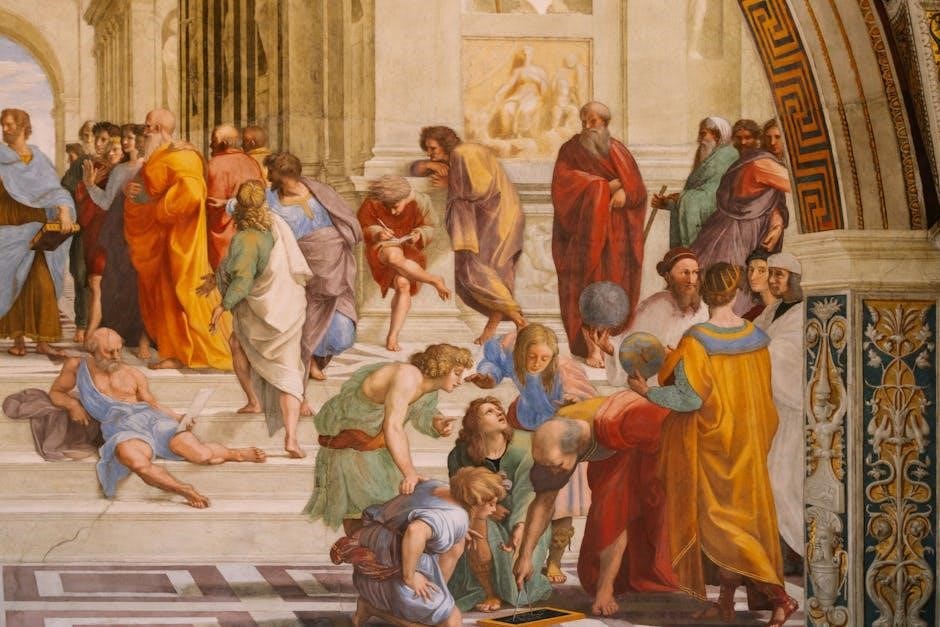Plato’s Five Dialogues, including Euthyphro, Apology, Crito, Meno, and Phaedo, are foundational texts in Western philosophy. Available in PDF formats, they explore justice, virtue, and the soul, offering profound insights into Platonic thought and Socratic methodology;
Overview of the Dialogues
Plato’s Five Dialogues—Euthyphro, Apology, Crito, Meno, and Phaedo—explore central philosophical themes. Euthyphro examines piety, Apology recounts Socrates’ trial, Crito discusses civic duty, Meno explores virtue and knowledge, and Phaedo delves into the soul’s immortality. These dialogues, available in PDF formats, provide a comprehensive introduction to Socratic thought and Platonic philosophy, offering insights into ethics, justice, and the nature of reality. They remain essential texts for understanding classical philosophy and its enduring influence.
Significance of the Five Dialogues in Platonic Philosophy
Plato’s Five Dialogues are cornerstone texts in Western philosophy, offering profound insights into ethics, justice, and the nature of reality. They introduce key concepts like the Theory of Forms and the immortality of the soul, while showcasing Socratic methodology. These dialogues not only define Platonic thought but also highlight the evolution of Socratic ideas, making them indispensable for understanding classical philosophy. Their accessibility in PDF formats has ensured their enduring influence and widespread study in modern scholarship.

The Euthyphro
Euthyphro is a dialogue exploring the concept of piety, featuring Socrates’ questioning of Euthyphro’s definition. It is one of Plato’s early works, available in PDF formats for study.
The dialogue begins with Socrates encountering Euthyphro outside the court, where Euthyphro is prosecuting his father for impiety. Euthyphro claims to know the true meaning of piety, prompting Socrates to challenge his definition. Through a series of questions, Socrates exposes the inconsistencies in Euthyphro’s understanding, leading to a deeper exploration of ethical concepts. The dialogue ultimately highlights the complexity of defining moral terms and the Socratic method of questioning.
Key Themes: Piety and Moral Philosophy
The dialogue explores the concept of piety, questioning its definition and moral implications. Euthyphro’s confidence in his understanding of piety is challenged by Socrates, revealing the tension between religious tradition and philosophical inquiry. The discussion underscores the complexity of defining moral terms and highlights the importance of critical examination in ethics. It also raises questions about divine authority versus human reason, central to Platonic philosophy and moral philosophy.

The Apology
The Apology is one of Plato’s Five Dialogues, presenting Socrates’ defense at his trial. It explores themes of justice, wisdom, and civic duty, central to Platonic philosophy.
Socrates’ Defense and Trial
In Plato’s The Apology, Socrates defends himself against charges of impiety and corrupting youth. He argues that his actions are divinely inspired, emphasizing his commitment to seeking wisdom and justice. The dialogue highlights Socrates’ method of questioning to expose ignorance, showcasing his belief in the importance of self-examination. His defense ultimately leads to his conviction, but the text remains a powerful exploration of moral integrity and the pursuit of truth.
The Concept of Civic Duty and Justice
In The Apology, Socrates emphasizes civic duty, arguing that his actions serve the state by promoting justice and wisdom. He asserts that true justice involves obeying the law and fulfilling one’s moral obligations, even if it leads to personal sacrifice. Socrates’ defense highlights the tension between individual conscience and societal expectations, illustrating his unwavering commitment to ethical principles and the greater good of Athens.

The Crito
Explores Socrates’ decision to accept death, emphasizing obedience to the state and moral obligation. Available in PDF formats from Hackett Publishing.
Socrates’ Decision to Accept Death
In the Crito, Socrates faces a moral dilemma: escape Athens or accept his death sentence. He argues that escaping would violate the laws he has upheld his entire life, emphasizing the importance of honoring civic duty. This dialogue, available in PDF formats, highlights Socrates’ commitment to justice and his belief that one must abide by the state’s decisions, even if they lead to personal harm; His decision underscores the tension between individual conscience and societal obligations.
Themes of Obedience to the State and Moral Obligation
The Crito explores the tension between obeying the state and adhering to personal moral principles. Socrates argues that escaping prison would violate the laws he has implicitly agreed to by living in Athens. He personifies the state as a parent, emphasizing loyalty and duty. This dialogue, available in PDF formats, highlights the moral conflict between civic obligation and individual conscience, showcasing Socrates’ unwavering commitment to justice and his belief in the moral superiority of accepting death over breaking the law.

The Meno
The Meno explores the nature of virtue and knowledge through Socrates’ dialogue with Meno and a slave boy, introducing the theory of recollection, available as PDF.
Exploration of Virtue and Knowledge
The Meno examines the nature of virtue and its relationship to knowledge. Socrates engages Meno in a dialogue about whether virtue can be taught, exploring the concept of innate knowledge. Through the theory of recollection, Socrates demonstrates that knowledge is not acquired but rather remembered, suggesting the soul’s immortality. This dialogue challenges traditional views of education, emphasizing the role of inquiry and recollection in understanding truth. The PDF versions of Plato’s dialogues provide accessible readings of these philosophical explorations.
The Theory of Recollection
In the Meno, Plato introduces the theory of recollection, arguing that knowledge is not acquired but rather remembered from the soul’s pre-existent state. Socrates demonstrates this by guiding an uneducated slave boy to discover geometric truths, showing that knowledge lies dormant and can be awakened through questioning. This theory supports Plato’s belief in the immortality of the soul, suggesting that learning is a process of recollecting eternal truths. The dialogue highlights the interplay between education and the soul’s inherent knowledge.

The Phaedo
The Phaedo explores Socrates’ final dialogue, focusing on the immortality of the soul and the Theory of Forms, while defending the soul’s existence beyond the physical body.
Discussion of the Immortality of the Soul
In the Phaedo, Socrates argues for the immortality of the soul, asserting its existence before birth and survival after death. He uses the theory of recollection to support this, claiming that knowledge is innate. Socrates also employs the cyclical argument, where life and death are seen as part of a natural process. This discussion aims to comfort his followers, emphasizing the soul’s immortality and encouraging a virtuous life. The dialogue profoundly explores the nature of existence and reality.
The Theory of Forms and the Nature of Reality
Plato’s Theory of Forms posits that non-material abstract forms represent the most accurate reality. These forms are perfect, immutable, and serve as templates for the imperfect physical world. In the Phaedo, Socrates argues that the soul’s immortality and its ability to recognize these forms through recollection confirm their existence. This theory underpins Plato’s metaphysics, suggesting a dualistic universe where the material world is a shadow of the eternal, unchanging realm of forms, such as justice, beauty, and goodness.

Historical and Philosophical Context
Plato’s dialogues are divided into early, middle, and late periods, reflecting the evolution of his philosophy. They build on Socratic thought, exploring justice, virtue, and reality.
The Evolution of Socratic Thought

The Socratic method evolves across Plato’s dialogues, from early ethical inquiries in Euthyphro to deeper metaphysical explorations in Phaedo. Early dialogues focus on defining virtues, while later works expand to justice and reality. Socrates shifts from questioning to expounding theories, reflecting Plato’s maturing philosophy. This progression highlights the development of Socratic thought, bridging ethics and metaphysics, and showcasing the gradual unveiling of Plato’s Theory of Forms.
Plato’s Use of Dialogue as a Literary Form
Plato employs dialogue to engage readers actively in philosophical inquiry, mirroring Socratic method. Through direct conversation, he conveys complex ideas dynamically, making abstract concepts accessible. Dialogues like Euthyphro and Phaedo showcase this format, fostering critical thinking and emotional connection. This literary approach ensures enduring relevance, as it invites readers to participate in the exploration of truth and wisdom.

Themes and Relevance
Plato’s dialogues explore timeless philosophical questions, offering insights into justice, virtue, and the human condition. Their relevance endures, influencing modern debates on ethics and existence.
Common Themes Across the Dialogues
Core themes in Plato’s Five Dialogues include the pursuit of justice, the nature of virtue, and the immortality of the soul. These works consistently emphasize the importance of reason and dialectical inquiry, showcasing Socrates’ method of questioning to uncover truth. The dialogues also explore the tension between individual conscience and societal expectations, highlighting ethical dilemmas that remain central to philosophical discourse today. These recurring motifs underscore the enduring relevance of Platonic philosophy in addressing fundamental human questions and moral complexities.
The Dialogues’ Relevance in Modern Philosophy
Plato’s Five Dialogues remain highly influential in modern philosophy, particularly in ethical theory, political philosophy, and metaphysics. The exploration of justice, virtue, and the soul resonates with contemporary debates on morality and governance. The dialogues’ emphasis on reason and dialectical inquiry aligns with modern philosophical methods, making them essential texts for understanding foundational concepts. Their timeless themes continue to inspire scholars and philosophers, ensuring their relevance in addressing current philosophical questions and challenges.
Plato’s Five Dialogues are timeless philosophical texts that profoundly explore justice, virtue, and the soul. Their enduring relevance continues to shape Western philosophy, offering insights into human existence and morality, ensuring their lasting legacy as essential readings for understanding Platonic thought and its universal applications.
Final Thoughts on the Five Dialogues
Plato’s Five Dialogues—Euthyphro, Apology, Crito, Meno, and Phaedo—offer profound insights into ethics, justice, and the nature of reality. These texts, widely available in PDF formats, remain central to philosophical studies, providing a window into Socratic methodology and Platonic thought. Their exploration of piety, moral obligation, and the immortality of the soul continues to resonate, making them indispensable for understanding Western philosophy’s foundations and their enduring relevance in modern thought.
